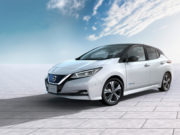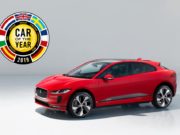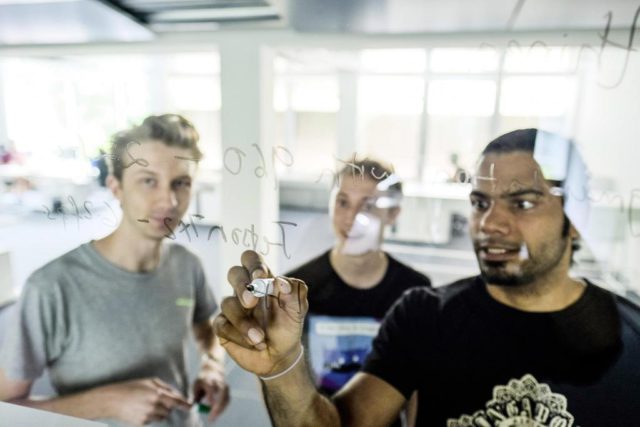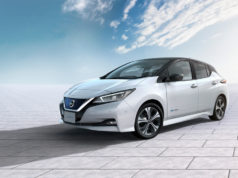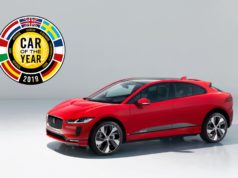How do people think? On what basis do they take decisions? And how can artificial intelligence help them in the future? An international expert team at the Volkswagen Information Technology Center Munich (Data Lab) pursues these questions.
IT experts, robotics specialists, data scientists, programmers, physicists and mathematicians work hand in hand, while preparing Volkswagen for the future. On dozens of monitors, code lines, graphs and 3-D diagrams flash across the screen. The processes there could help accelerate corporate processes, as well as optimize traffic flows and guide autonomous vehicles safely through the traffic in the future.
„We are developing learning systems. We are exploring and creating algorithms that can identify and predict patterns and laws more and more reliably”, says Prof. Dr. Patrick van der Smagt, who is responsible for AI research at the Data Lab. One of the areas where he and his team are active is deep neural networks. In these networks, the algorithm gains information in several steps and compares it with what it already has as data. This way, the system can detect patterns and laws more and more reliably. “We are carrying out fundamental research in this field”, says van der Smagt. “Volkswagen is at the leading edge.”
A few doors away, down a corridor, practice succeeds theory. Dr. Hakan Duman and his team examine with the application of such advanced AI systems. Duman heads the data science and applied AI section of the data lab. “We test AI systems and always ask a number of questions. Where can AI systems be used effectively? What corporate processes and tasks are well-suited for the use of AI and how can this approach be implemented?”, says Duman.
Duman’s team is working on a number of different projects mainly focusing on applications and processes within the company
These include, for example, AI systems for intelligent robots which are to work hand-in-hand with human beings in the future. Another project deals with the next generation of traffic flow optimization. The team is also working on possibilities of protecting sensitive data from attack by hackers using advanced AI systems.
A change of scene: the Wolfsburg plant, headquarters of the Volkswagen Group, where CIO Dr. Martin Hofmann sits in a simply equipped office. “Artificial intelligence is becoming a key competitive factor and will be an essential element in many technologies and corporate processes”, says Hofmann. “This is why we are laying the foundation for the independent development and use of high-performance AI systems at Volkswagen. We have a clear goal. We do not want to leave know-how to others.“
It is by no means just a question of feasibility. “We work intensively on ethical aspects. For us, the use of artificial intelligence is not an end in itself. Artificial intelligence must always help human beings in a meaningful way,” says Hofmann. This is another reason why Volkswagen consistently adopts an open source approach and major sections of the software are made available to the public. The development work carried out by the specialists is transparent and can be verified. Hofmann emphasizes: “AI systems will provide support for people but people will remain the decision-makers.”
In the Volkswagen Information Technology Center Munich, the group’s artificial intelligence competence center, people keep their fingers on the button
Sometimes this applies quite literally. If a few lines of code do not function as expected. All that people can do, even in the high-tech center, is to firmly press the “restart” button.
The future is real at the #IAA2017: #VWID, #VWIDBUZZ & #VWIDCROZZ. #VW #auto pic.twitter.com/E4JhjaZIkA
— Volkswagen News (@vwpress_en) September 21, 2017
Earlier this year – in June – Volkswagen announced it would work with chipmaker Nvidia on deep learning software. The software could be used to manage traffic flows or make it easier for humans to work with robots, Reuters reported.
“Artificial intelligence is the key to the digital future of the Volkswagen Group,” Volkswagen Chief Information Officer Martin Hofmann said in a statement.
“We want to develop and deploy high-performance AI systems ourselves. This is why we are expanding our expert knowledge required. Cooperation with Nvidia will be a major step in this direction,” he said.
Nvidia became famous in the gaming industry for designing graphics processing chips, but in recent years has been a key player in the automotive sector for providing the so-called “brain” of the autonomous vehicle.
The U.S.-based group separately announced it was also partnering with Volvo Cars and Swedish auto supplier Autoliv to develop self-driving car technology for vehicles. They are due to hit the market by 2021.
In April 2017 Financial Times announced that Volkswagen is setting up a joint venture with Mobvoi
The German carmaker invested $180m in the Chinese company, which has the backing of Google. On its part Mobvoi should provide VW with its voice recognition and language processing technologies, while the German carmaker will provide a platform for technology.
“All cars will soon be digitalised, they will become like mobile computers” said Mobvoi’s founder Li Zhifei, quoted by FT. “We want to enable voice interaction and personalised services and accelerating [the development of] driverless cars.”












